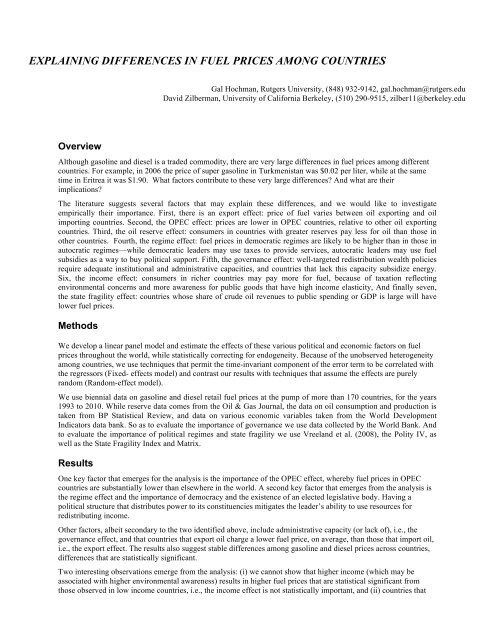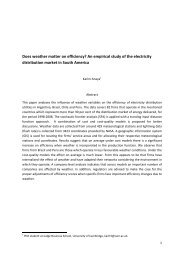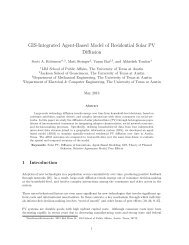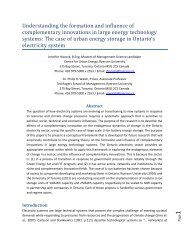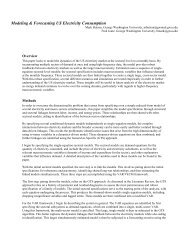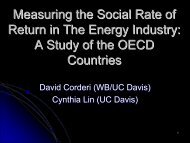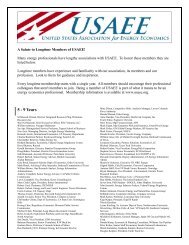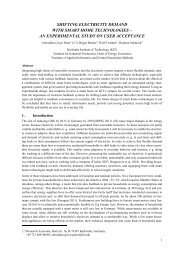explaining differences in fuel prices among countries - United States ...
explaining differences in fuel prices among countries - United States ...
explaining differences in fuel prices among countries - United States ...
Create successful ePaper yourself
Turn your PDF publications into a flip-book with our unique Google optimized e-Paper software.
EXPLAINING DIFFERENCES IN FUEL PRICES AMONG COUNTRIESGal Hochman, Rutgers University, (848) 932-9142, gal.hochman@rutgers.eduDavid Zilberman, University of California Berkeley, (510) 290-9515, zilber11@berkeley.eduOverviewAlthough gasol<strong>in</strong>e and diesel is a traded commodity, there are very large <strong>differences</strong> <strong>in</strong> <strong>fuel</strong> <strong>prices</strong> <strong>among</strong> different<strong>countries</strong>. For example, <strong>in</strong> 2006 the price of super gasol<strong>in</strong>e <strong>in</strong> Turkmenistan was $0.02 per liter, while at the sametime <strong>in</strong> Eritrea it was $1.90. What factors contribute to these very large <strong>differences</strong>? And what are theirimplications?The literature suggests several factors that may expla<strong>in</strong> these <strong>differences</strong>, and we would like to <strong>in</strong>vestigateempirically their importance. First, there is an export effect: price of <strong>fuel</strong> varies between oil export<strong>in</strong>g and oilimport<strong>in</strong>g <strong>countries</strong>. Second, the OPEC effect: <strong>prices</strong> are lower <strong>in</strong> OPEC <strong>countries</strong>, relative to other oil export<strong>in</strong>g<strong>countries</strong>. Third, the oil reserve effect: consumers <strong>in</strong> <strong>countries</strong> with greater reserves pay less for oil than those <strong>in</strong>other <strong>countries</strong>. Fourth, the regime effect: <strong>fuel</strong> <strong>prices</strong> <strong>in</strong> democratic regimes are likely to be higher than <strong>in</strong> those <strong>in</strong>autocratic regimes—while democratic leaders may use taxes to provide services, autocratic leaders may use <strong>fuel</strong>subsidies as a way to buy political support. Fifth, the governance effect: well-targeted redistribution wealth policiesrequire adequate <strong>in</strong>stitutional and adm<strong>in</strong>istrative capacities, and <strong>countries</strong> that lack this capacity subsidize energy.Six, the <strong>in</strong>come effect: consumers <strong>in</strong> richer <strong>countries</strong> may pay more for <strong>fuel</strong>, because of taxation reflect<strong>in</strong>genvironmental concerns and more awareness for public goods that have high <strong>in</strong>come elasticity, And f<strong>in</strong>ally seven,the state fragility effect: <strong>countries</strong> whose share of crude oil revenues to public spend<strong>in</strong>g or GDP is large will havelower <strong>fuel</strong> <strong>prices</strong>.MethodsWe develop a l<strong>in</strong>ear panel model and estimate the effects of these various political and economic factors on <strong>fuel</strong><strong>prices</strong> throughout the world, while statistically correct<strong>in</strong>g for endogeneity. Because of the unobserved heterogeneity<strong>among</strong> <strong>countries</strong>, we use techniques that permit the time-<strong>in</strong>variant component of the error term to be correlated withthe regressors (Fixed- effects model) and contrast our results with techniques that assume the effects are purelyrandom (Random-effect model).We use biennial data on gasol<strong>in</strong>e and diesel retail <strong>fuel</strong> <strong>prices</strong> at the pump of more than 170 <strong>countries</strong>, for the years1993 to 2010. While reserve data comes from the Oil & Gas Journal, the data on oil consumption and production istaken from BP Statistical Review, and data on various economic variables taken from the World DevelopmentIndicators data bank. So as to evaluate the importance of governance we use data collected by the World Bank. Andto evaluate the importance of political regimes and state fragility we use Vreeland et al. (2008), the Polity IV, aswell as the State Fragility Index and Matrix.ResultsOne key factor that emerges for the analysis is the importance of the OPEC effect, whereby <strong>fuel</strong> <strong>prices</strong> <strong>in</strong> OPEC<strong>countries</strong> are substantially lower than elsewhere <strong>in</strong> the world. A second key factor that emerges from the analysis isthe regime effect and the importance of democracy and the existence of an elected legislative body. Hav<strong>in</strong>g apolitical structure that distributes power to its constituencies mitigates the leader’s ability to use resources forredistribut<strong>in</strong>g <strong>in</strong>come.Other factors, albeit secondary to the two identified above, <strong>in</strong>clude adm<strong>in</strong>istrative capacity (or lack of), i.e., thegovernance effect, and that <strong>countries</strong> that export oil charge a lower <strong>fuel</strong> price, on average, than those that import oil,i.e., the export effect. The results also suggest stable <strong>differences</strong> <strong>among</strong> gasol<strong>in</strong>e and diesel <strong>prices</strong> across <strong>countries</strong>,<strong>differences</strong> that are statistically significant.Two <strong>in</strong>terest<strong>in</strong>g observations emerge from the analysis: (i) we cannot show that higher <strong>in</strong>come (which may beassociated with higher environmental awareness) results <strong>in</strong> higher <strong>fuel</strong> <strong>prices</strong> that are statistical significant fromthose observed <strong>in</strong> low <strong>in</strong>come <strong>countries</strong>, i.e., the <strong>in</strong>come effect is not statistically important, and (ii) <strong>countries</strong> that
import more oil do not necessary have higher <strong>fuel</strong> <strong>prices</strong>, suggest<strong>in</strong>g that the fiscal fragility effect and dependenceon <strong>fuel</strong> tax revenues is not statistically related to volume of oil-imports.ConclusionsThe analysis identifies two <strong>in</strong>herent political economic factors that affect <strong>fuel</strong> <strong>prices</strong>. This suggests thatthe heterogeneity of <strong>fuel</strong> <strong>prices</strong> <strong>among</strong> nations will cont<strong>in</strong>ue, and that <strong>in</strong>creases <strong>in</strong> crude oil <strong>prices</strong> will translate tohigher <strong>prices</strong> <strong>in</strong> some <strong>countries</strong> but not <strong>in</strong> others. This diversified outcome will result <strong>in</strong> a differentiated approach toenergy conservation and adoption of alternative <strong>fuel</strong>s. This prediction stems from the notion that adoption occursonly when a critical <strong>in</strong>dicator, <strong>in</strong> our case <strong>fuel</strong> <strong>prices</strong>, reach a threshold level above which adoption of alternativesare worthwhile.Indeed, <strong>countries</strong> that <strong>in</strong>vested <strong>in</strong> research and development of alternatives to fossil <strong>fuel</strong>s experienced large <strong>in</strong>creases<strong>in</strong> <strong>fuel</strong> <strong>prices</strong> dur<strong>in</strong>g the last decade, while <strong>countries</strong> that had low and very stable <strong>fuel</strong> <strong>prices</strong> did not <strong>in</strong>vest much <strong>in</strong>renewable technologies and are not diversify<strong>in</strong>g their primary energy sources.To conclude, our work suggests that with the <strong>in</strong>crease <strong>in</strong> crude oil <strong>prices</strong> we will observe a transition away fromfossil <strong>fuel</strong>s <strong>in</strong> some <strong>countries</strong> but not <strong>in</strong> others. The composition of primary energy will shift away from fossil <strong>fuel</strong>s<strong>in</strong> oil-import<strong>in</strong>g <strong>countries</strong>, but will result <strong>in</strong> the oil-export<strong>in</strong>g <strong>countries</strong> consum<strong>in</strong>g relatively more of these domesticfossil <strong>fuel</strong> resources. Although many <strong>countries</strong> have elim<strong>in</strong>ated or at least reduced their <strong>fuel</strong> subsidies (IEA 2011:World Energy Outlook 2010), we hypothesize that cheap <strong>fuel</strong>s will always be observed <strong>in</strong> some oil-rich <strong>countries</strong>, aswell as <strong>in</strong> autocratic <strong>countries</strong>.


